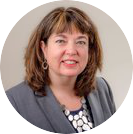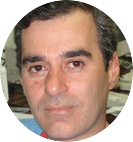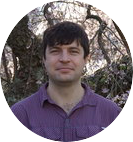SRSF Testimonials
Sleep Research Society Foundation programs make a tremendous impact on the sleep and circadian research community. Recipients of SRSF awards share their experiences below:


“While the National Institutes of Health is the best biomedical research grant system in the world, this system cannot serve all research needs. The two areas of research where SRSF grants fill a void are, first, promising young investigators just starting out who need start-up funds to get moving towards an NIH grant. The second is for highly innovative or “outside the box” research. I was fortunate enough to receive an Elliot Weitzman Innovative Research Award, which allowed my group to begin to identify microRNA markers in the blood that index the severity of brain injury in sleep apnea. We obtained promising results and will continue in this direction to be able to identify who is at risk of brain injury from all sorts of sleep disorders. We make our biggest advances in sleep medicine when allowed to think outside the box. Thank you SRSF!”
– Sigrid Veasey
“The SRSF grant support helped launch my independent research career. Often times it can be difficult for junior investigators to secure large federal grants. Support through the SRSF allowed me to establish a track record of extramural funding, which ultimately helped me successfully apply for NIH funding.”
– Joseph Dzierzewski


“Although I am a seasoned investigator, the funds provided by the Sleep Research Society Foundation Elliot D. Weitzman, MD, Research Grant, was critical for us to get pilot data that allowed us to acquire funding in an R01 from NIMH. We have since published a number of papers that cite this funding. I am most appreciative for this support because it led to our genetics work in college students and subsequently to a collaboration with behavioral geneticists with expertise in molecular and quantitative genetics and also with colleagues who study C. elegans. Our collaborative work was recently published in SLEEP (Huang et al., 2017), and we have a grant proposal under review to extend this work. I hope that the Foundation continues to offer opportunities to help young investigators, and to assist senior investigators to pursue their scientific dreams as well.”
– Mary Carskadon
“There are few, if any, sleep-specific funding options for new or early career researchers so the SRSF grant was an important recognition and source of support when I was starting out. The funding supported a new project and the recognition by the SRS was a boost to tell me I was on the right track.”
– Joanna MacLean


“The SRSF funding was extremely helpful in advancing my career in a number of ways. Being awarded funding from a sleep-focused organization established me as a sleep researcher in the eyes of those who would review my credentials for future funding applications. The award also provided me the opportunity to gain experience in designing and conducting a clinical trial. As an early career researcher, this was really the most helpful aspect of the award. What I learned during this first trial has informed my approach to all of my subsequent work. Moreover, I have been able to cite the study in grant submissions to convey my experience with conducting sleep-focused research. I am convinced that I would not have realized the same level of success had I not received the SRSF award, and believe the SRSF is essential to developing and maintaining the field of sleep research.”
– Christy Ulmer
“The SRSF grant gave me confidence that I could somehow survive as a researcher, though it is still not easy. When I applied for the grant, I was beginning my independence and was unsure if I could have a viable research career. The research project was costly because I wanted to use non-invasive neuro-imaging techniques to conduct human sleep research to understand patio-temporal dynamics of brain activations involved in learning consolidation. The SRSF grant was a kind of approval from the field – allowing me to believe the proposed project was worth pursuing.”
– Yuka Sasaki


“I received a Gillin Award in 2010 for a project entitled “Sleep and Circadian Phase Disruption in Postpartum Depression.” Fast forward 7 years and I have had two NIMH-funded grants — a K23 from 2010-2016 and an ongoing R34 — related to this initial pilot work. We performed the first prospective study of women’s circadian rhythms across the perinatal period and have developed a non-pharmacologic chronotherapy intervention for perinatal mood disorders that targets circadian rhythms and sleep timing. The Gillin funding launched my research program. In addition to advancing my career (I am now an Associate Professor and Assistant Dean at Alpert Medical School of Brown University), this project has provided research opportunities for more than 10 medical students and undergraduate researchers. Grants from the SRSF are a relatively modest investment that can have a huge payoff.”
– Kathy Sharkey
“The funding provided by SRSF was crucial for my research career. The SRSF grant allowed me to obtain fundamental initial results in order to receive additional research funding. I am very grateful for that.”
– Fernando Louzada


“I received an SRSF Early Career Development Research Award in 2016, shortly after starting my lab as a new Assistant Professor last May. Although my university has provided funding to begin my lab, receiving external funding to support my research during this stage is especially crucial for developing a productive and sustainable sleep research program. SRSF support has provided me with the financial support to begin new projects that otherwise would have been delayed – pilot data collected during my grant has grown into two research projects that are using the fruit fly to understand the basic functions of sleep that support learning and brain plasticity. Because of the data that I collected during my SRSF grant, both projects have received additional funding from the Human Frontiers Science Program and a Klingenstein-Simons Fellowship to continue and grow over the coming years.”
– Jeff Donlea
“The SRSF grant enabled me to make the move to my first faculty appointment and at an institution with a mentor with whom I wanted to work and train. The SRSF support also provided the preliminary data needed to successfully apply for and receive a K01 from the NIDDK. Since receiving the SRSF funding, I have been extremely successful at securing research money including internal and federal grants.”
– Josiane Broussard


“The research supported by my SRSF award provided data to secure additional research funding in the form of an NIH F32 individual postdoctoral fellowship, facilitating my continued training and career advancement. Additionally, my SRSF grant provided funds for training opportunities for new analysis techniques supporting additional first-author manuscripts enhancing my publication record and ability to secure a tenure track professor position in the coming year. As I am transitioning to an independent investigator over the coming years I expect the lasting benefits of my SRSF award will continue supporting this transition stage of my career even though my SRSF funding period is complete.”
– Christopher Depner

